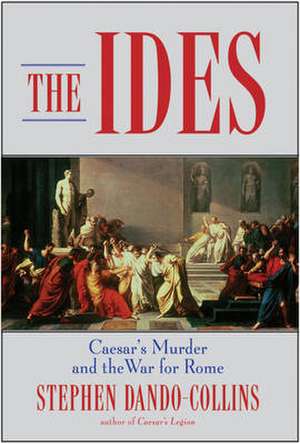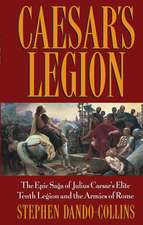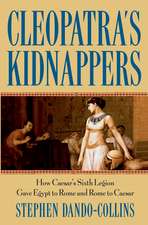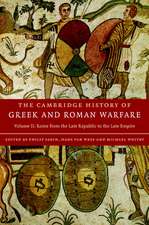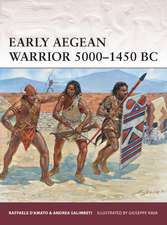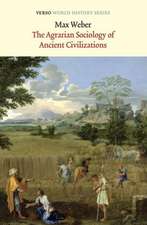The Ides: Caesar's Murder and the War for Rome
Autor Stephen Dando-Collinsen Limba Engleză Hardback – 4 feb 2010
A compelling history that is packed with intrigue and written with the pacing of a first–rate mystery, The Ides will challenge what you think you know about Julius Caesar and the Roman Empire.
Preț: 190.68 lei
Nou
Puncte Express: 286
Preț estimativ în valută:
36.49€ • 39.76$ • 30.75£
36.49€ • 39.76$ • 30.75£
Carte disponibilă
Livrare economică 02-16 aprilie
Preluare comenzi: 021 569.72.76
Specificații
ISBN-13: 9780470425237
ISBN-10: 0470425237
Pagini: 269
Dimensiuni: 167 x 241 x 25 mm
Greutate: 0.49 kg
Editura: Wiley (TP)
Locul publicării:Hoboken, United States
ISBN-10: 0470425237
Pagini: 269
Dimensiuni: 167 x 241 x 25 mm
Greutate: 0.49 kg
Editura: Wiley (TP)
Locul publicării:Hoboken, United States
Public țintă
1. Fans of the Roman Empire, especially the Caesars. 2. The millions of people who made Gladiator, Troy, 300, and HBO′s Rome huge successes.3. Fans of Steven Pressfield′s books, Gates of Fire, Tides of War, and Last of the Amazons, as well as fans of Steven Saylor′s Roma Sub Rosa series and other novels set in ancient Rome.
4. Military history aficionados, especially those who bought the competing titles.
Descriere
Unraveling the many mysteries surrounding the murder of Julius Caesar
The assassination of Julius Caesar is one of the most notorious murders in history. Two thousand years after it occurred, many compelling questions remain about his death: Was Brutus the hero and Caesar the villain? Did Caesar bring about his own death by planning to make himself king of Rome? Was Mark Antony aware of the plot, and did he let it go forward? Who wrote Antony′s script after Caesar′s death? Using historical evidence to sort out these and other puzzling issues, historian and award–winning author Stephen Dando–Collins takes you to the world of ancient Rome and recaptures the drama of Caesar′s demise and the chaotic aftermath as the vicious struggle for power between Antony and Octavian unfolded. For the first time, he shows how the religious festivals and customs of the day affected the way the assassination plot unfolded. He shows, too, how the murder was almost avoided at the last moment.
Praise for Stephen Dando–Collins
"Absorbing . . . Military history is the muscle of this book, with enough political sinews to give it coherence."
The Washington Times on Caesar′s Legion
"The meticulous research and racy writing style make this a fascinating and revealing book."
The Good Book Guide on Cleopatra′s Kidnappers
"Cleverly structured and well paced."
The Age on Nero′s Killing Machine
"A tough, gritty chronicle."
Booklist on Mark Antony′s Heroes
"A work to keep you fascinated, and to make you wonder at the web of deceit that could occur in Rome."
BBC History Magazine on Blood of the Caesars
The assassination of Julius Caesar is one of the most notorious murders in history. Two thousand years after it occurred, many compelling questions remain about his death: Was Brutus the hero and Caesar the villain? Did Caesar bring about his own death by planning to make himself king of Rome? Was Mark Antony aware of the plot, and did he let it go forward? Who wrote Antony′s script after Caesar′s death? Using historical evidence to sort out these and other puzzling issues, historian and award–winning author Stephen Dando–Collins takes you to the world of ancient Rome and recaptures the drama of Caesar′s demise and the chaotic aftermath as the vicious struggle for power between Antony and Octavian unfolded. For the first time, he shows how the religious festivals and customs of the day affected the way the assassination plot unfolded. He shows, too, how the murder was almost avoided at the last moment.
Praise for Stephen Dando–Collins
"Absorbing . . . Military history is the muscle of this book, with enough political sinews to give it coherence."
The Washington Times on Caesar′s Legion
"The meticulous research and racy writing style make this a fascinating and revealing book."
The Good Book Guide on Cleopatra′s Kidnappers
"Cleverly structured and well paced."
The Age on Nero′s Killing Machine
"A tough, gritty chronicle."
Booklist on Mark Antony′s Heroes
"A work to keep you fascinated, and to make you wonder at the web of deceit that could occur in Rome."
BBC History Magazine on Blood of the Caesars
Textul de pe ultima copertă
Unraveling the many mysteries surrounding the murder of Julius Caesar
The assassination of Julius Caesar is one of the most notorious murders in history. Two thousand years after it occurred, many compelling questions remain about his death: Was Brutus the hero and Caesar the villain? Did Caesar bring about his own death by planning to make himself king of Rome? Was Mark Antony aware of the plot, and did he let it go forward? Who wrote Antony′s script after Caesar′s death? Using historical evidence to sort out these and other puzzling issues, historian and award–winning author Stephen Dando–Collins takes you to the world of ancient Rome and recaptures the drama of Caesar′s demise and the chaotic aftermath as the vicious struggle for power between Antony and Octavian unfolded. For the first time, he shows how the religious festivals and customs of the day affected the way the assassination plot unfolded. He shows, too, how the murder was almost avoided at the last moment.
Praise for Stephen Dando–Collins
"Absorbing . . . Military history is the muscle of this book, with enough political sinews to give it coherence."
The Washington Times on Caesar′s Legion
"The meticulous research and racy writing style make this a fascinating and revealing book."
The Good Book Guide on Cleopatra′s Kidnappers
"Cleverly structured and well paced."
The Age on Nero′s Killing Machine
"A tough, gritty chronicle."
Booklist on Mark Antony′s Heroes
"A work to keep you fascinated, and to make you wonder at the web of deceit that could occur in Rome."
BBC History Magazine on Blood of the Caesars
The assassination of Julius Caesar is one of the most notorious murders in history. Two thousand years after it occurred, many compelling questions remain about his death: Was Brutus the hero and Caesar the villain? Did Caesar bring about his own death by planning to make himself king of Rome? Was Mark Antony aware of the plot, and did he let it go forward? Who wrote Antony′s script after Caesar′s death? Using historical evidence to sort out these and other puzzling issues, historian and award–winning author Stephen Dando–Collins takes you to the world of ancient Rome and recaptures the drama of Caesar′s demise and the chaotic aftermath as the vicious struggle for power between Antony and Octavian unfolded. For the first time, he shows how the religious festivals and customs of the day affected the way the assassination plot unfolded. He shows, too, how the murder was almost avoided at the last moment.
Praise for Stephen Dando–Collins
"Absorbing . . . Military history is the muscle of this book, with enough political sinews to give it coherence."
The Washington Times on Caesar′s Legion
"The meticulous research and racy writing style make this a fascinating and revealing book."
The Good Book Guide on Cleopatra′s Kidnappers
"Cleverly structured and well paced."
The Age on Nero′s Killing Machine
"A tough, gritty chronicle."
Booklist on Mark Antony′s Heroes
"A work to keep you fascinated, and to make you wonder at the web of deceit that could occur in Rome."
BBC History Magazine on Blood of the Caesars
Cuprins
Atlas. Author′s Note.
Introduction′
PART ONE THE CONSPIRACY.
I January 26, 44 b.c.: Seven Weeks before the Assassination.
II February 15, 44 b.c.: The Lupercalia.
III February 22, 44 b.c.: The Caristia Reconciliation.
IV February 24, 44 b.c.: Pressuring Brutus.
V March 1, 44 b.c., The Kalends of March: Dictator for Life.
VI March 2, 44 b.c.: Recruiting Fellow Assassins.
VII March 7, 44 b.c.: A Visit from One of Caesar′s Generals.
VIII March 9, 44 b.c.: Porcia′s Secret.
IX March 14, 44 b.c., Afternoon: Cleopatra and the Equirria.
X March 14, 44 b.c., Evening: The Best Sort of Death.
PART TWO THE MURDER.
XI March 15, 44 b.c.: The Ides of March: Caesar Awakens.
XII March 15, 44 b.c.: The Ides of March: In the Dark before Dawn.
XIII March 15, 44 b.c., The Ides of March: Caesar Must Suffer Caesar′s Fate.
XIV March 15, 44 b.c., The Ides of March: The Crime.
XV March 15, 44 b.c.: The Gathering Storm.
PART THREE AFTERMATH AND RETRIBUTION.
XVI March 16, 44 b.c.: Pleading for the Republic.
XVII March 17, 44 b.c.: The Jostle for Control.
XVIII March 18, 44 b.c.: The Liberators Gain the Advantage.
XIX March 19, 44 b.c.: Caesar′s Will.
XX March 20, 44 b.c.: Caesar′s Funeral.
XXI March 21, 44 b.c.: Antony Consolidates His Grip.
XXII March 24, 44 b.c.: Enter Octavius.
XXIII March 27, 44 b.c.: The Name of Caesar.
XXIV April 7, 44 b.c.: Wise Oppius.
XXV April 10, 44 b.c.: Caesar′s Heir.
XXVI April 11, 44 b.c.: Octavian Meets with Antony.
XXVII April 14, 44 b.c.: The Aedile′s Refusal.
XXVIII April 22, 44 b.c.: Octavian Seeks Cicero′s Support.
XXIX May 11, 44 b.c.: I Don′t Trust Him a Yard.
XXX May 18, 44 b.c.: Undermining Antony.
XXXI May 31, 44 b.c.: Reforming the Praetorian Cohorts.
XXXII June 2, 44 b.c.: Antony Outsmarts the Senate.
XXXIII June 7, 44 b.c.: No Plan, No Thought, No Method.
XXXIV July 13, 44 b.c.: The Last Day of Brutus′s Games.
XXXV July 20, 44 b.c.: The Liberators′ Manifesto.
XXXVI July 28, 44 b.c.: Cicero′s Departure.
XXXVII August 16, 44 b.c.: Like Hector the Hero.
XXXVIII August 30, 44 b.c.: Cicero Returns to Rome.
XXXIX September 15, 44 b.c.: The Liberators Reach Greece.
XL September 23, 44 b.c.: Octavian′s Nineteenth Birthday.
XLI September 28, 44 b.c.: The Plot to Assassinate Antony.
XLII October 9, 44 b.c.: A Dreadful State of Affairs.
XLIII October 18, 44 b.c.: Antony Joins His Legions.
XLIV November 4, 44 b.c.: Octavian Recruits an Army.
XLV November 18, 44 b.c.: The Road to War.
XLVI November 27 30, 44 b.c.: Anthony′s Legions Rebel.
XLVII Early December 44 b.c.: The Rise of the Liberators.
XLVIII Second Half of December 44 b.c.: Antony Makes His Move.
XLIX January 1 4, 43 b.c.: Debating Antony′s Fate.
L Late December 44 b.c. Early January 43 b.c.: The First Assassin to Fall.
LI February 4, 43 b.c.: State of Emergency.
LII April 14 26, 43 b.c.: The Mutina Battles.
LIII May 7, 43 b.c.: Cassius Overruns Syria.
LIV May 30, 43 b.c.: Lepidus s Betrayal.
LV August 19, 43 b.c.: Octavian Charges Caesar′s Murderers.
LVI Early November 43 b.c.: The Triumvirate and the Proscription.
LVII December 7, 43 b.c.: Killing Cicero.
LVIII October 1 21, 42 b.c.: The Battles of Philippi.
LIX Judging the Assassins and the Victim.
Notes.
Bibliography.
Index.
Introduction′
PART ONE THE CONSPIRACY.
I January 26, 44 b.c.: Seven Weeks before the Assassination.
II February 15, 44 b.c.: The Lupercalia.
III February 22, 44 b.c.: The Caristia Reconciliation.
IV February 24, 44 b.c.: Pressuring Brutus.
V March 1, 44 b.c., The Kalends of March: Dictator for Life.
VI March 2, 44 b.c.: Recruiting Fellow Assassins.
VII March 7, 44 b.c.: A Visit from One of Caesar′s Generals.
VIII March 9, 44 b.c.: Porcia′s Secret.
IX March 14, 44 b.c., Afternoon: Cleopatra and the Equirria.
X March 14, 44 b.c., Evening: The Best Sort of Death.
PART TWO THE MURDER.
XI March 15, 44 b.c.: The Ides of March: Caesar Awakens.
XII March 15, 44 b.c.: The Ides of March: In the Dark before Dawn.
XIII March 15, 44 b.c., The Ides of March: Caesar Must Suffer Caesar′s Fate.
XIV March 15, 44 b.c., The Ides of March: The Crime.
XV March 15, 44 b.c.: The Gathering Storm.
PART THREE AFTERMATH AND RETRIBUTION.
XVI March 16, 44 b.c.: Pleading for the Republic.
XVII March 17, 44 b.c.: The Jostle for Control.
XVIII March 18, 44 b.c.: The Liberators Gain the Advantage.
XIX March 19, 44 b.c.: Caesar′s Will.
XX March 20, 44 b.c.: Caesar′s Funeral.
XXI March 21, 44 b.c.: Antony Consolidates His Grip.
XXII March 24, 44 b.c.: Enter Octavius.
XXIII March 27, 44 b.c.: The Name of Caesar.
XXIV April 7, 44 b.c.: Wise Oppius.
XXV April 10, 44 b.c.: Caesar′s Heir.
XXVI April 11, 44 b.c.: Octavian Meets with Antony.
XXVII April 14, 44 b.c.: The Aedile′s Refusal.
XXVIII April 22, 44 b.c.: Octavian Seeks Cicero′s Support.
XXIX May 11, 44 b.c.: I Don′t Trust Him a Yard.
XXX May 18, 44 b.c.: Undermining Antony.
XXXI May 31, 44 b.c.: Reforming the Praetorian Cohorts.
XXXII June 2, 44 b.c.: Antony Outsmarts the Senate.
XXXIII June 7, 44 b.c.: No Plan, No Thought, No Method.
XXXIV July 13, 44 b.c.: The Last Day of Brutus′s Games.
XXXV July 20, 44 b.c.: The Liberators′ Manifesto.
XXXVI July 28, 44 b.c.: Cicero′s Departure.
XXXVII August 16, 44 b.c.: Like Hector the Hero.
XXXVIII August 30, 44 b.c.: Cicero Returns to Rome.
XXXIX September 15, 44 b.c.: The Liberators Reach Greece.
XL September 23, 44 b.c.: Octavian′s Nineteenth Birthday.
XLI September 28, 44 b.c.: The Plot to Assassinate Antony.
XLII October 9, 44 b.c.: A Dreadful State of Affairs.
XLIII October 18, 44 b.c.: Antony Joins His Legions.
XLIV November 4, 44 b.c.: Octavian Recruits an Army.
XLV November 18, 44 b.c.: The Road to War.
XLVI November 27 30, 44 b.c.: Anthony′s Legions Rebel.
XLVII Early December 44 b.c.: The Rise of the Liberators.
XLVIII Second Half of December 44 b.c.: Antony Makes His Move.
XLIX January 1 4, 43 b.c.: Debating Antony′s Fate.
L Late December 44 b.c. Early January 43 b.c.: The First Assassin to Fall.
LI February 4, 43 b.c.: State of Emergency.
LII April 14 26, 43 b.c.: The Mutina Battles.
LIII May 7, 43 b.c.: Cassius Overruns Syria.
LIV May 30, 43 b.c.: Lepidus s Betrayal.
LV August 19, 43 b.c.: Octavian Charges Caesar′s Murderers.
LVI Early November 43 b.c.: The Triumvirate and the Proscription.
LVII December 7, 43 b.c.: Killing Cicero.
LVIII October 1 21, 42 b.c.: The Battles of Philippi.
LIX Judging the Assassins and the Victim.
Notes.
Bibliography.
Index.
Recenzii
Trying to clear away the "twaddle" that surrounds Julius Caesar, Dando–Collins (Caesar′s Legion) provides a page–turner of a history describing step–by–step the events leading to the assassination of Julius Caesar and the impact of his removal on the collapse of the Roman Republic. Caesar′s rise to power and his limitless ambition posed an immediate threat to the survival of the Republic, which caused fear and consternation in those, such as Marcus Brutus, who nobly wished to defend Roman democracy. Brutus and his fellow senator Cassius planned the assassination and, with the help of yet other senators, carried it out on March 15, 44 B.C.E. Public sentiment originally favored the Liberators, as the assassins were known, but, thanks to the scheming of Marc Antony and the fickleness of the crowds, Brutus, Cassius, and others were forced to flee the city. In the months that followed, Antony and his sometime ally, Caesar′s heir, Octavian, destroyed the Liberators only to later wage war against each other. Antony′s ultimate defeat led to Octavian′s installation as the first emperor, Augustus Caesar. The dramatic story examines the roles of soldiers, politicians, philosophers, wives, and mistresses with perhaps too much emphasis placed on the ever–popular Cleopatra. 2 maps. (Feb.) (Publishers Weekly, December 21, 2009)
Notă biografică
Stephen Dando–Collins is an Australian–born historian and award–winning author who has spent more than three decades studying the individual legions of the Roman army of the late Republic and the empire of the Caesars. He is the author of Caesar′s Legion: The Epic Saga of Julius Caesar′s Elite Tenth Legion and the Armies of Rome, Nero′s Killing Machine: The True Story of Rome′s Remarkable Fourteenth Legion, Cleopatra′s Kidnappers: How Caesar′s Sixth Legion Gave Egypt to Rome and Rome to Caesar, Mark Antony′s Heroes: How the Third Gallica Legion Saved an Apostle and Created an Emperor, and Blood of the Caesars: How the Murder of Germanicus Led to the Fall of Rome.
